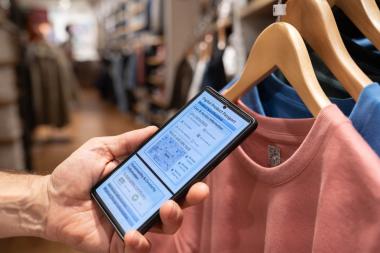Promoting transparent supply chains and a more circular economy with digital product passports
Any prospective buyer interested in knowing more about the products they have set their eyes on will have to cope with limited information on print or online manuals or engage in time-consuming research. This may change soon, as the European Commission introduced a standardised digital product passport for the upcoming legislation. A project consortium has been formed with partners from industry and academia to set ground for the developments. The idea is for the proposed passports, supported by EU regulations, to make all product information available along the entire value chain and easily accessible e.g. by QR code.
ID cards and passports are usually the first things packed when one goes on a journey. They are internationally recognized and accepted documents with all the necessary information about the holder: Commonplace items for people that will soon become just as common for electronic devices, textiles, or batteries. But mobile phones, tablet computers, and their kin usually do not travel with a passport pouch, so their digital product passports with all their “personal details” will soon be accessible at every link in the value chain via a QR code or RFID chip.
Consumers looking to buy a new piece of clothing, a piece of electronics, or even furniture or toys should have more means to understand important information about their products, including their energy efficiency, the labor conditions during manufacturing, or their reparability, in order to make informed and sustainable purchasing choices.
Product passports also hold great potential for other actors, e.g. for repairs or recycling. Current electronic products, often highly miniaturized, make it hard to understand with materials, not least toxic substances are contained and how they could be separated from another. Use-specific certificates can regulate that this type of information is available to the people who need to know it.
No final decision has yet been made about the range of information that will be contained in the product passports. For the CIRPASS project, Eduard Wagner and his team at Fraunhofer ZM is currently surveying which types of information are already covered by current legal requirements and which additional information could be contained on a digital product passport. Their aim is to provide an information architecture that determines which types of information have added value for which actors in the value chain and at what cost this information could be provided. A reparability scale that shows how easily a product is to repair has been required in France since 2021 and might be a good inclusion in the digital, pan-European product passport. “Information about energy efficiency is already required, but this information still has to be prepared on a case-by-case basis, and there are no universal European disclosure requirements for other types of circularity related information. Meaningful standardization here is one of the top goals of the product passport. Imagine we could compare the durability of all t-shirts in the EU between each other,” says sustainability expert Eduard Wagner.
For the first product passports to be ready by 2026, many actors still need to be brought on board and a consensus be found for which information is most relevant. “Our project has identified 23 groups of stakeholders that we are including in our survey of requirements, in all three sectors”, Wagner explains. “We have suppliers of materials, manufacturers of electronics, and representatives of repair and recycling associations with us.” The results of these consultations will go to the European Commission to act as pointers for the political process en route to new legal requirements for the product passport. Small to medium-sized enterprises are given special attention and support in this, as providing the required information can mean a considerable effort on their part.
Fraunhofer Fraunhofer IZM supply chain supply chain Retail Textile and clothing industry
Fraunhofer Institute for Reliability and Microintegration IZM


